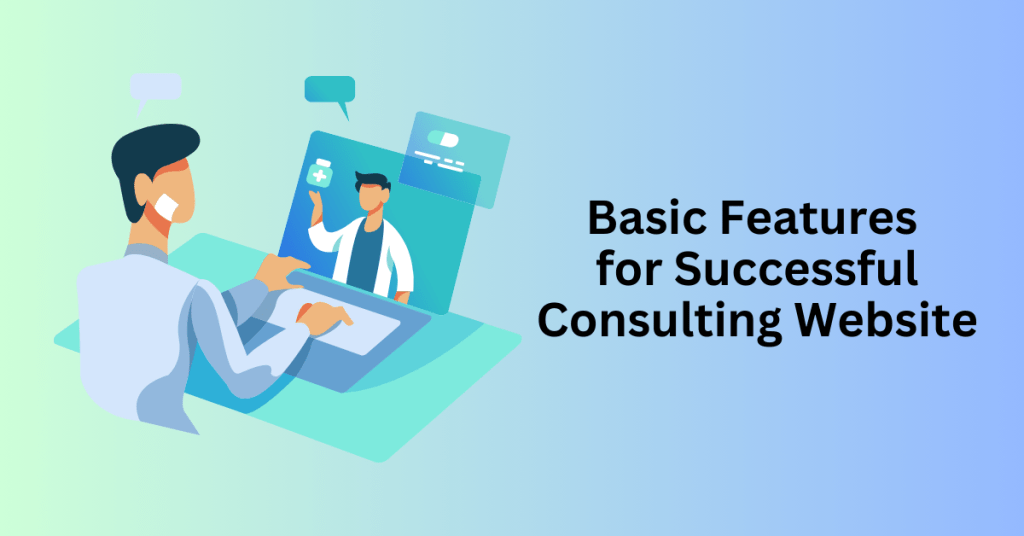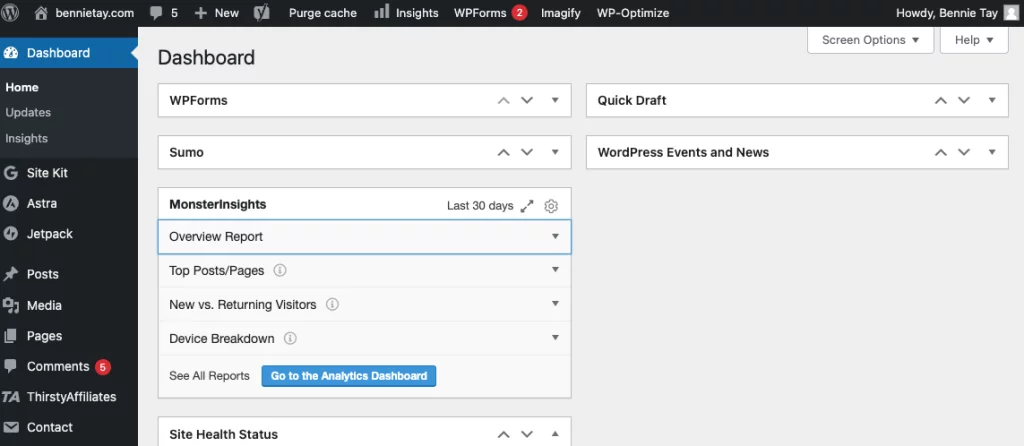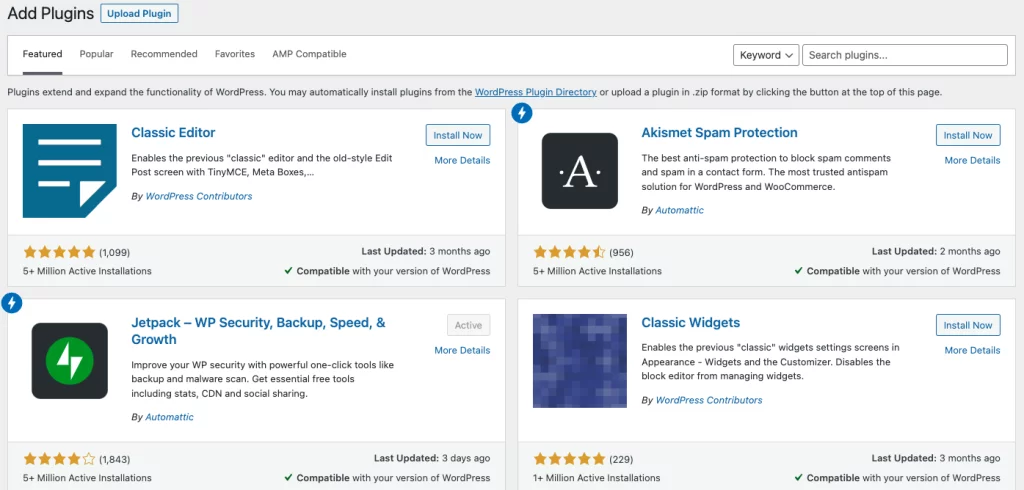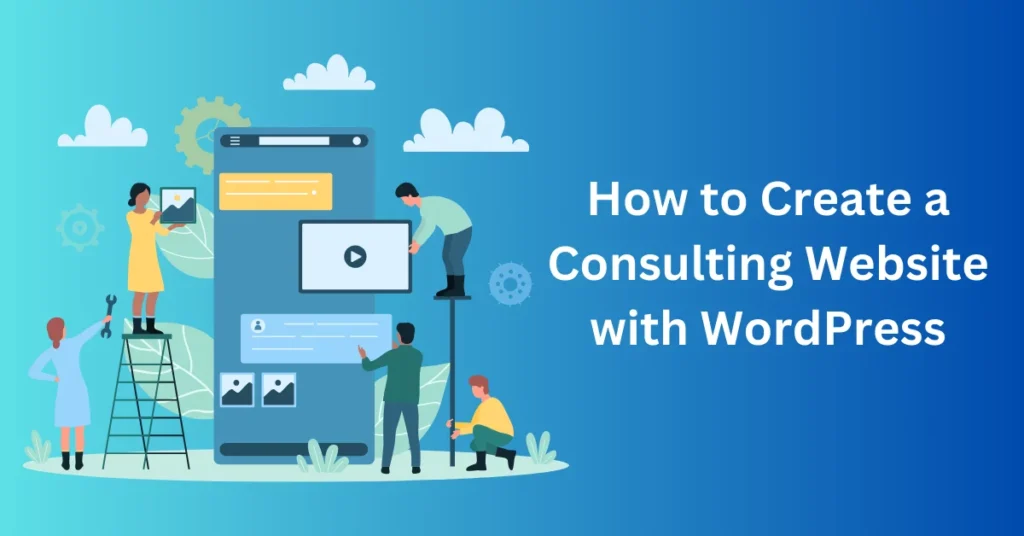Are you considering building a consulting website on WordPress? Operating a consulting business necessitates the presence of a website that showcases your identity and the array of services you provide. In addition, establishing authority in search engines, within your professional network, and among potential clients is greatly facilitated by the existence of a well-crafted website.
While maintaining a presence on social media and other marketing platforms is important, your website serves as the central hub for individuals interested in your services. Visitors may seek to get into your consulting offerings, peruse examples of your work, and explore opportunities for collaboration on potential projects.
An effective consulting website should spotlight your strengths, expertise, and the distinctive solutions and services you offer to your clientele. This comprehensive guide to creating a consultant website covers everything from the different types of consulting websites to the step-by-step process of building your own professional online presence.
Start Your WordPress Consulting Website Today – Exclusive Discount Available
Different Types of Consulting

There are different types of Consulting services and websites that you can build on WordPress for your business.
1. Management consulting
Management consulting involves providing specialized expertise to assist companies in tackling a wide range of issues related to management, leadership, operations, and other organizational challenges. This service is a subset of the broader consulting industry, which addresses various business areas to enhance overall performance.
Companies engage management consultants for several reasons. One key motivation is the need for an unbiased perspective, which can be difficult for internal executives to maintain due to their deep involvement in the organization. Besides, management consultants bring an external, impartial viewpoint that helps identify and address problems more effectively. They offer strategic advice, facilitate change management, and help optimize business processes, thereby driving efficiency and growth.
2. Marketing consulting
Marketing consulting focuses on providing expert advice and strategies to enhance all facets of marketing efforts. Specifically, this includes identifying target audiences, crafting compelling messages, selecting appropriate channels, and measuring the impact of marketing campaigns. Ultimately, the goal is to reach and captivate potential customers to drive business growth.
Clients turn to marketing consultants to improve the effectiveness of their marketing initiatives. These experts begin by analyzing market trends, customer behaviour, and competitive landscapes. Then, they develop and implement strategies designed to attract more leads and convert them into loyal customers. In addition, by leveraging their specialized knowledge, marketing consultants help businesses refine their branding, increase market share, and achieve a higher return on investment from their marketing activities.
3. Sales consulting
Sales consulting offers expertise in various aspects of sales management, including leadership, training, and performance optimization. Besides, sales consultants work with organizations to enhance their sales strategies, develop robust sales teams, and implement effective sales processes.
Businesses seek the help of sales consultants when they face challenges in generating sales, building and managing sales teams, training sales personnel, and monitoring sales performance. These consultants provide tailored solutions to improve sales techniques, foster a high-performance sales culture, and ultimately increase revenue. By addressing specific issues and opportunities within the sales function, sales consultants then help companies achieve their sales targets and sustain long-term growth.
4. Non-profit consulting
Nonprofit and governance consulting involves providing expert advice and tailored strategies to nonprofit organizations and government entities. This assistance can also include fundraising, developing effective marketing campaigns, implementing technology solutions, enhancing governance structures, and addressing other specialized needs unique to these sectors.
Clients seek out nonprofit and governance consultants because these organizations operate under different principles and constraints compared to for-profit businesses. Nonprofits and government agencies often face unique challenges, such as navigating complex regulatory environments, maximizing limited resources, and meeting specific stakeholder expectations. Consultants specializing in these areas bring a deep understanding of the sector’s intricacies, offering solutions that are sensitive to the mission-driven and public-oriented nature of their clients. This expertise will also helps organizations enhance their impact, improve operational efficiency, and achieve their strategic goals.
5. HR consulting
Human resources (HR) consulting provides specialized expertise to assist businesses and organizations with various aspects of managing their workforce. This includes hiring, training, managing employee relations, developing HR policies, and retaining talent. Additionally, HR consultants often help design and implement comprehensive HR strategies and plans.
Clients hire HR consultants because creating effective HR plans and processes can be complex and resource-intensive. Additionally, maintaining employee satisfaction and productivity is a challenging and ongoing task. HR consultants bring valuable insights and solutions to help organizations manage their human capital more effectively. They offer support in areas such as organizational development, compensation and benefits planning, compliance with labor laws, and employee engagement strategies. By leveraging their expertise, HR consultants help businesses build a strong, motivated, and productive workforce.
6. IT consulting
Software and IT consulting involves offering specialized knowledge and skills in software development, software engineering, and information technology. Given the high risk associated with software and IT projects, with many facing potential failure, the expertise of consultants in this field is highly valued.
Companies enlist the help of software and IT consultants to ensure the successful planning, execution, and completion of their technology initiatives. These consultants provide support in various areas, such as developing and implementing new software systems, optimizing existing IT infrastructures, ensuring cybersecurity, and managing data. Besides, they bring deep technical knowledge and practical experience to help organizations overcome specific challenges, streamline their IT operations, and achieve their technology goals. By engaging software and IT consultants, companies can then reduce risks, improve project outcomes, and stay competitive in a rapidly evolving technological landscape.
7. Business Strategy consulting
Strategy consulting involves providing guidance and advice on high-level decision-making and long-term planning for businesses. This type of consulting is focused on helping organizations develop strategies to achieve their goals, enhance competitive advantage, and drive growth. Experienced strategy consultants bring extensive industry knowledge and an objective perspective, offering insights that can be invaluable when making critical business decisions.
Companies often turn to strategy consultants when they face challenges in devising effective plans to reach their objectives. These consultants help organizations analyze market trends, assess competitive landscapes, identify growth opportunities, and formulate actionable strategies. By leveraging their expertise, strategy consultants can then assist businesses in navigating complex environments, thereby optimizing performance and ensuring sustainable success.
8. Science Research consulting
Science and medical research consulting involves providing specialized expertise to organizations engaged in scientific or medical research. Besides, this type of consulting can cover a wide range of areas, including scientific analysis, research methodologies, lab management, and the business or operational aspects of running research facilities.
Clients seek the services of science and medical research consultants for various reasons. Some organizations need assistance with scientific analysis and research to improve their efficiency and productivity. Others, such as research clinics and laboratories, require help with managing their operations and ensuring compliance with industry standards and regulations. In all cases, clients are looking for consultants with deep, specialized knowledge that is not available within their organization. These experts help optimize research processes, enhance the quality and impact of research outcomes, and support the overall advancement of scientific and medical knowledge.
9. Business Transformation consulting
Digital transformation consulting involves aiding companies in leveraging and integrating advanced technologies to enhance employee performance and overall business operations. This type of consulting focuses on driving technological innovation to improve efficiency, productivity, and competitiveness.
Clients hire digital transformation consultants because many companies find themselves lagging behind competitors in adopting new technologies. These consultants help organizations navigate the complex process of digital transformation, which includes modernizing legacy systems, implementing new digital tools, optimizing business processes, and fostering a culture of continuous innovation. Hence, by providing expert guidance, digital transformation consultants enable businesses to transition smoothly to a more digital-centric model, ultimately leading to improved operational efficiency, better customer experiences, and sustained growth.
10. eCommerce Business Growth consulting
eCommerce consulting involves providing specialized expertise to companies that sell their products online. This encompasses a wide range of areas, including marketing, sales, operations, and supply chain management. In addition, eCommerce businesses are complex and multifaceted, requiring comprehensive strategies that address everything from online marketing and customer acquisition to logistics and order fulfillment.
Clients seek eCommerce consulting services when they aim to enhance the value of their business and streamline their operations. These consultants assist in developing and implementing effective go-to-market strategies, optimizing website performance, improving customer experience, and managing the intricacies of supply chains. Hence, by leveraging their expertise, eCommerce consultants help businesses increase online sales, improve operational efficiency, and achieve long-term success in the competitive digital marketplace.
Start Your WordPress Consulting Website Today – Exclusive Discount Available
Basic Features for Successful Consulting Website

While building a website can be simple with WordPress, it is important that your consulting website consists of these important elements.
Professional design
A successful consulting website should feature a professional design that immediately makes a positive impression, effectively conveying the expertise and professionalism of the firm. Key elements of this design include:
- Modern Aesthetics: The website should have a contemporary look, using clean lines, sophisticated colour schemes, and up-to-date design trends.
- Visual Appeal: The site should be visually engaging, utilizing high-quality graphics and an attractive layout.
- Intuitive Navigation: An easy-to-navigate layout ensures visitors can quickly find the information they need, enhancing user experience.
- Attention to Detail: Careful design details, such as well-aligned elements, consistent spacing, and thoughtful typography, communicate the firm’s reliability and attention to detail in their work.
Consistent Branding
Consistent branding is crucial for building brand recognition and trust. It involves:
- Uniform Visual Elements: Using the same colors, fonts, and design elements across all pages and marketing materials creates a cohesive look.
- Coherent User Experience: Consistent branding across the website ensures visitors have a seamless and familiar experience.
- Reinforcement of Identity and Values: The consistent use of logos, taglines, and brand-specific elements helps reinforce the firm’s identity and core values, making the brand more memorable.
High-quality Image
High-quality photography is essential for creating a professional-looking consulting website. This includes:
- Professional Headshots: High-resolution images of the consulting team convey professionalism and approachability.
- Office Environment Images: Photos of the office setting can help create a connection with potential clients by showcasing the firm’s working environment.
- Relevant Visuals: Authentic and high-resolution photos related to the firm’s services and expertise enhance trustworthiness and professionalism.
Client-focused Message
Client-focused messaging ensures that the content on a consulting firm’s website addresses the specific needs, challenges, and concerns of potential clients. Rather than merely showcasing the firm’s accomplishments and services, the messaging should highlight how these services can benefit the client. This approach makes the content more relatable and appealing, demonstrating that the firm understands and prioritizes the client’s objectives. Key aspects include:
- Understanding Client Pain Points: Clearly articulating the common problems and challenges faced by potential clients.
- Solution-Oriented Content: Emphasizing how the firm’s services can effectively resolve these issues and add value.
- Client Success Stories: Sharing examples of how the firm has helped clients achieve their goals, making the messaging more tangible and persuasive.
Social Proof
Incorporating elements of social proof, such as client testimonials, case studies, and reviews, is crucial for establishing credibility and trust. These elements provide concrete evidence of the firm’s expertise and success in addressing client issues. Enhancing credibility can be achieved through:
- Client Testimonials: Featuring quotes and feedback from satisfied clients.
- Case Studies: Detailed accounts of specific client engagements and outcomes, showcasing problem-solving capabilities.
- Reviews and Ratings: Displaying positive reviews and ratings from reputable platforms.
- Logos of Previous Clients: Including logos of well-known clients to signify trust and reliability.
- Industry Awards and Media Mentions: Highlighting accolades and recognitions from reputable sources.
Clear call-to-action (CTA)

A clear call-to-action (CTA) is essential for guiding visitors towards taking desired actions, such as scheduling a consultation, signing up for a newsletter, or downloading a resource. Effective CTAs should be:
- Prominently Displayed: Placed in easily noticeable areas on the webpage.
- Action-Oriented: Using persuasive language that encourages immediate action (e.g., “Get Started Today,” “Schedule Your Free Consultation”).
- Value-Focused: Emphasizing the benefits or value that the visitor will receive by taking the action.
Website Performance
Ensuring fast website performance is crucial for keeping users engaged and minimizing bounce rates. Slow-loading websites can frustrate visitors and lead to quick departures. To guarantee fast loading times, consider:
- Optimizing Images: Reducing the size of images without compromising quality to enhance load speed.
- Utilizing Browser Caching: Storing static files temporarily in the visitor’s browser to reduce load times on subsequent visits.
- Reliable Hosting Service: Choosing a dependable hosting provider that offers high performance and uptime.
- Minimizing Code: Reducing the amount of HTML, CSS, and JavaScript code to ensure faster processing.
Typography
Selecting readable typography is crucial for ensuring that your website’s content is accessible and easy to understand on all screen sizes and devices. Effective typography not only enhances the user experience but also guarantees that visitors can effortlessly comprehend the information on your site. Key considerations include:
- Font Selection: Choose fonts that are clear and legible, avoiding overly decorative or complex typefaces.
- Font Size: Use sizes that are large enough to be read comfortably on various devices, typically starting at 16px for body text.
- Line Height: Ensure appropriate spacing between lines to enhance readability and prevent text from appearing cramped.
- Contrast: Create a strong contrast between text and background to ensure readability, especially for users with visual impairments.
- Consistency: Maintain consistent use of fonts and styles throughout the website to create a cohesive and professional look.
Contact information
Having easily accessible and comprehensive contact details is crucial for converting website visitors into clients. This involves:
- Dedicated Contact Page: Create a specific page for contact information, ensuring it is easy to find.
- Multiple Contact Methods: Include your phone number, email address, physical address, and a contact form.
- Clear Presentation: Present contact details in a straightforward and uncluttered manner.
- Social Media Links: Provide links to your social media profiles as additional ways for clients to reach out.
About Us Page

The About Us page should provide a thorough overview of your consulting firm, highlighting its history, values, and team members. Incorporating trust elements can further establish credibility and personalize your brand. Key components include:
- Firm History and Values: Share your company’s background, mission, and core values to give visitors insight into what drives your firm.
- Team Member Biographies: Include brief biographies and photos of key team members, emphasizing their qualifications, experience, and roles within the firm.
- Professional Certifications and Affiliations: Highlight any relevant certifications, memberships in professional organizations, and industry affiliations.
- Client Testimonials and Case Studies: Incorporate quotes and success stories from clients to demonstrate your firm’s impact and reliability.
- Visual Elements: Use high-quality images and possibly a video introduction to make the page more engaging and personable.
Start Your WordPress Consulting Website Today – Exclusive Discount Available
How to Create a Consulting Website on WordPress
Step 1: Get a Web Hosting Service
Selecting a reliable web hosting service is the cornerstone of building a successful consulting website. To make an informed choice, start by evaluating your website’s specific requirements, such as the expected traffic volume, the nature of the content to be hosted (e.g., images, videos, blogs), and any specific software or platforms that will be utilized.
When choosing a web hosting service, consider several key factors. Server speed is essential to ensure quick loading times, enhancing both user experience and search engine optimization (SEO) rankings. High uptime guarantees are crucial for minimizing downtime and maintaining site reliability. Hence, you should look for hosts that offer at least a 99.9% uptime guarantee.

Besides, security features should also be a top priority, with robust options such as SSL certificates, firewalls, and regular backups to protect your website and visitor data. Additionally, consider the scalability options available, which will allow your website to handle increased traffic as it grows over time.
Start Your WordPress Consulting Website Today – Exclusive Discount Available
Step 2. Choose A Domain Name for Your Consulting Website
Your domain name serves as your online identity and acts as the digital representation of your brand in the vast online landscape. When selecting a domain name, it is important to opt for one that reflects your brand and is easy to remember and spell. This ensures that your primary audience can easily find and recall your website, thereby enhancing your online presence and brand recognition.

The domain name should be relevant to your business and industry, helping potential clients understand what you offer. Additionally, you should check for the availability of the desired domain name and consider securing similar domain extensions such as .com, .net, and .org to protect your brand. By carefully selecting a domain name that aligns with these criteria, you ensure that your consulting website effectively represents your brand and is easily accessible to your target audience.
Step 3. Create your Consulting website on WordPress
Once you have your domain and hosting set up, it’s time to create your website. Website templates simplify the process of building websites, making them accessible even for those with limited technical skills. Bluehost offers professionally designed templates that are customizable to develop an appealing consultant website that resonates with your customers.
Then, navigate to the Bluehost dashboard from the WordPress admin panel to edit your site. There are different tools available to personalize your site. Once satisfied with your edits, click on the ‘Publish’ button to make your website live.

Otherwise, if you prefer not to build your website yourself or lack the time to do so, you can always hire someone from Fiverr or Upwork to build it for you. This way, you can focus on building your brand and promoting your business while professionals handle the website development.
Start Your WordPress Consulting Website Today – Exclusive Discount Available
Step 4: Create Important Pages for Your Consulting Website
When creating a consulting website on WordPress, it’s essential to include the following pages:
1. About Page
The About page is where you share your brand’s compelling narrative and provide comprehensive information about yourself and your background. This page should highlight your expertise, experience, and values, establishing trust with potential clients.
Additionally, include a compelling call to action on this page, encouraging visitors to schedule an introductory call or reach out to learn more about your services.
2. Client Testimonials
Integrating authentic, glowing feedback from your clients on your website is a powerful way to build trust and convert potential clients into loyal customers. Testimonials showcase the positive experiences of past clients, demonstrating the value and impact of your consulting services.
3. Contact Page
The Contact page is where you emphasize all the ways potential clients can reach out to you. You may include contact information such as social media profiles, email, and a contact form for easy communication.
Additionally, offering seamless appointment scheduling on this page can enhance user experience and streamline the client outreach process.
4. Member Site
Leverage your expertise and valuable content by offering exclusive membership access to high-quality online courses, classes, newsletters, and videos. A member site provides additional value to clients and can serve as a recurring revenue stream for your consulting business.
5. Portfolio Page
Showcase the impressive work you’ve completed, the impactful roles you’ve undertaken, the esteemed clients you’ve collaborated with, and the outstanding results you’ve delivered for them. The Portfolio page is where you highlight your past successes and demonstrate your capabilities to potential clients. Besides, it’s also an ideal place to highlight the types of ambitious projects you aim to undertake in the future.
6. Services Page
A Services page is an essential component of your consulting website, showcasing the range of services you offer. If you have digital products, include captivating product descriptions or service details to emphasize how your offerings will help your audience solve their problems and achieve their goals.
7. Blog
A blog serves as a powerful platform to provide valuable free resources that attract prospective clients. Maintaining and consistently updating a blog will position your consulting website as a recognized source of fresh, invaluable content for search engines.
In addition, your blog posts can cover industry insights, tips, case studies, and thought leadership content, establishing your expertise and driving traffic to your website.
Step 5. Include Social Proof to Your Consulting Website
Utilize social proof effectively by presenting evidence that supports your claims and establishes credibility. This can include:
- Client Testimonials: Showcase feedback from satisfied clients, highlighting their positive experiences working with your consulting services.
- Case Studies: Provide detailed case studies that demonstrate the impact and results of your work with previous clients.
- Logos of Collaborating Organizations: Display logos of reputable organizations with which you’ve collaborated or been featured, reinforcing your credibility and expertise.
You can showcase social proof on dedicated pages, a collective portfolio page, or directly on your homepage to maximize visibility and impact.
Step 6. Install Plugins to Simplify Your Consulting Website Process
Simplify your workflow and reduce administrative tasks on your consulting website with the following features:
- Self-Scheduling Calendar: Add a self-scheduling calendar to your website, allowing prospective clients to book and adjust appointments and classes independently, saving you time and streamlining the booking process.
- Custom Intake Forms: Incorporate custom intake forms into your appointment booking process to gather all relevant information about prospective clients or their projects upfront, facilitating smoother consultations.
- Invoicing Tool: Select an invoicing tool that simplifies the completion of appointment types and fees, allows for duplication of invoices, and enables easy tracking of their status, ensuring efficient payment processing.
- Email Templates: Prepare email templates for common client interactions, such as appointment reminders and follow-ups, and schedule them to be sent automatically before or after consultations, saving you time and maintaining consistent communication.
- Cancellation Policy: Establish a clear cancellation policy to set expectations about respecting your time and protect your bottom line. Consider obtaining payment information or a deposit at the time of booking to handle no-shows or late cancellations effectively.

By implementing these features, you can streamline your workflow, enhance client satisfaction, and focus your time and energy on delivering exceptional consulting services.
Step 7. Publish Your Consulting Website
Once your consulting website is ready, it’s time to introduce it to the public. Before doing so, it’s crucial to ensure a smooth user experience by testing it on different devices. This includes desktop computers, laptops, tablets, and smartphones. Besides, testing ensures that your website is responsive and functions properly across various screen sizes and platforms. By conducting thorough testing, you can identify and address any usability issues or technical glitches before launching your website to the public.
Step 8. Promote Your Consulting Website
Promoting your consulting website is essential for attracting visitors and driving traffic to your site. There are various marketing platforms and strategies you can utilize to achieve this:
- Social Media: Utilize popular social media platforms such as Facebook, Twitter, LinkedIn, and Instagram to promote your website and engage with your target audience. You can also share informative content, updates, and announcements to attract followers and encourage them to visit your website.
- Email Newsletters: Build an email list of subscribers and send out regular newsletters to keep them informed about your consulting services, blog posts, promotions, and upcoming events. Email marketing is an effective way to nurture leads and drive traffic to your website.
- SEO Optimization: Optimize your website for search engines to improve its visibility and ranking in search engine results pages (SERPs). You may then conduct keyword research, optimize meta tags and descriptions, create high-quality content, and build backlinks to increase organic traffic to your website.
- Encourage Sharing: Encourage your website visitors to share your blog posts and experiences on their social networks. Incorporate social sharing buttons on your website to make it easy for visitors to share your content with their followers, expanding your reach and driving more traffic to your site.
Step 9. Update and Maintain Your Consulting Website Regularly
Ensuring that your consulting website remains relevant, engaging, and effective in attracting leads requires ongoing updates and maintenance. Regularly checking for broken links or outdated information is essential to providing a seamless user experience and maintaining credibility with your audience. In addition, by choosing Bluehost to create your consulting website on WordPress, you automatically gain access to analytics tools that provide valuable insights into your website’s performance.
With access to analytics, you can track metrics such as website traffic, bounce rate, and conversion rates. These metrics offer valuable insights into your audience’s behaviour, preferences, and interactions with your website. By analyzing this data, you can identify areas for improvement and adjust your content accordingly to better meet the needs and preferences of your target audience.
For example, if you notice a high bounce rate on a particular page, you can investigate the reasons behind it. Then, make necessary adjustments to improve engagement and retention. Similarly, if you find that certain content or features are driving higher conversion rates, replicate those strategies. Apply them across other areas of your website to enhance its overall effectiveness in generating leads.
Final Thoughts: How to Create a Consulting Website with WordPress
Creating a consulting website with WordPress offers numerous opportunities for consultants. It helps to also establish a strong online presence and market their services effectively. By following the steps in this guide, consultants can build a professional and engaging website. This website will showcase their expertise, attract potential clients, and differentiate them in the competitive consulting landscape.
Choosing the right hosting service is the first crucial step. Selecting a suitable theme is equally important. Optimizing the website for search engines is another key factor. Each of these steps plays a vital role in creating a successful consulting website.
On the other hand, WordPress offers flexibility and customization options. These tools allow consultants to create a website that reflects their unique brand. It also helps them communicate their value proposition to clients effectively. Investing time and effort into a well-designed and informative website is essential. This investment can also unlock new opportunities for growth and success in their consulting careers.
Start Your WordPress Consulting Website Today – Exclusive Discount Available


